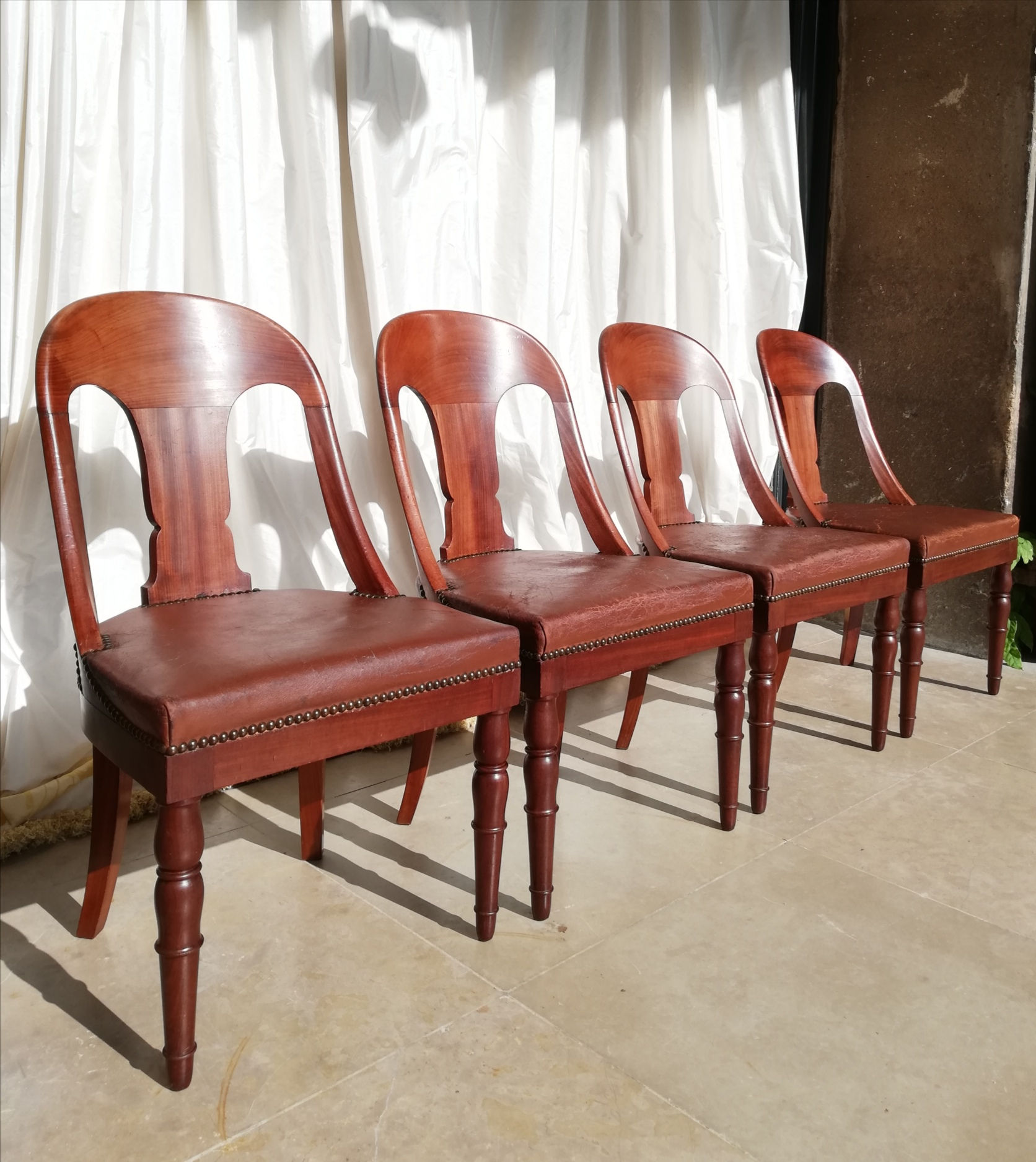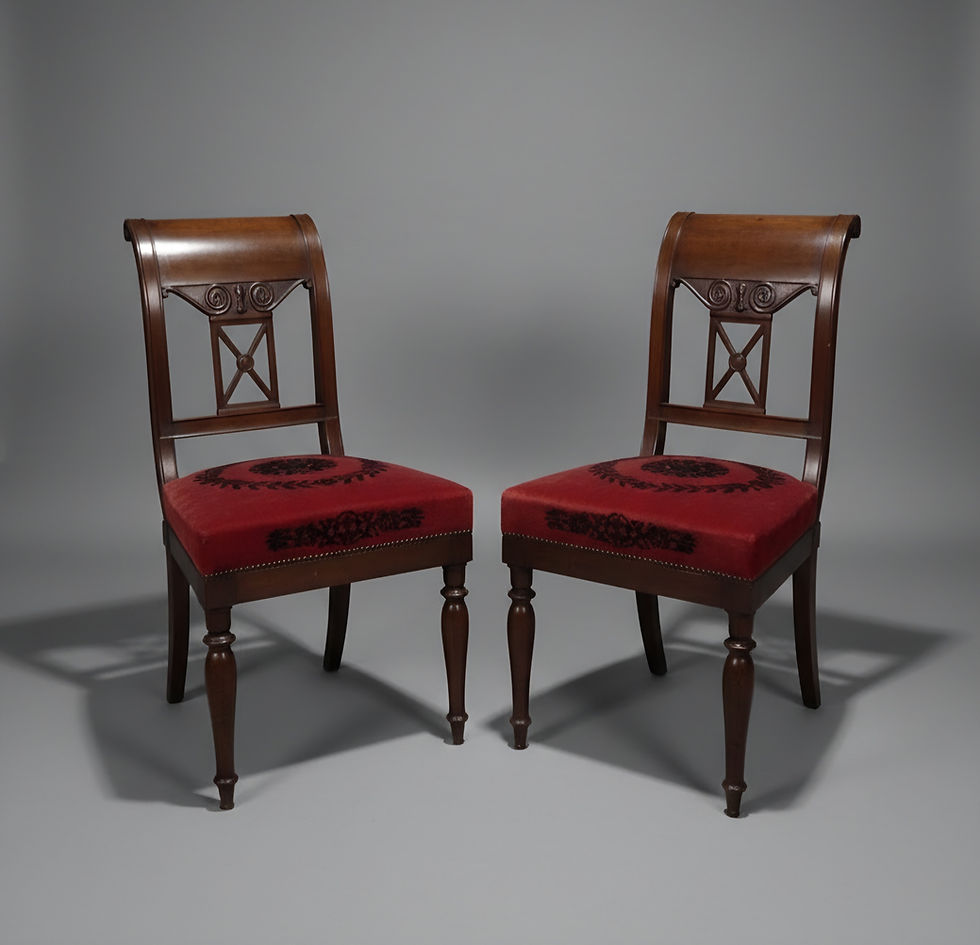Superb suite of four chairs with openwork gondola backs in mahogany and mahogany veneer, each stamped JACOB. DRMESLÉE (stamp used between 1803 and 1813), from the castle of Soult-Berg in Saint Amans Labastide (renamed Saint-Amans-Soult) and from the estate of Marshal Soult Jean De Dieu, Duke of Dalmatia (1769-1851, Marshal of the Emperor Napoleon).
The inventory of the castle, as indicated by the label still present on each chair, referencing them in the cabinet of Madame la Maréchale Soult, Louise Berg.
Front feet called "Jacob", rear feet saber shaped.
Their seat is covered with brown leather, probably original, the wear and tear of which gives the whole a lot of character.
I wanted to photograph this set in daylight so that you can enjoy them without artifice.
Given their signatures added to their provenance, I offer these four chairs at a very low estimated value, between € 9,000 and € 12,000.
Usual restorations.
Marshal Soult (Jean de Dieu):
Born in Saint-Amans-la Bastide in (1769), he enlisted in 1785 in the Royal-Infantry regiment (n ° 24). Sergeant in 1791, he was appointed brigadier general in 1794, and major general in 1799; he took part in the battle of Zurich, then in the defense of Genoa, where Masséna appointed him lieutenant-general.
Marshal of the Empire in 1804, he took part in the battles of Austerlitz, Jena and Eylau.
Made Duke of Dalmatia in 1808, he fought in Spain until 1812. In 1814, he tried to stop Wellington's invasion in the south, but he was beaten in Toulouse.
Minister of War under the First Restoration, he rallied to Napoleon at the Hundred Days, was made Peer of France and appointed Major General of the Army of the North.
He had, on March 8, 1815, published the following agenda:
Soldiers! This man who not long ago abdicated in the eyes of all Europe a usurped power, of which he had made such fatal use, Buonaparte descended on French soil which he was never to see again.
What does he want ? the civil war: what is he looking for? traitors: where would he find them? would it be among these soldiers that he deceived and sacrificed so many times by misleading their bravery? would it be among these families that his name alone still fills with fear?
Buonaparte despises us enough to believe that we can abandon a legitimate and well-loved ruler to share the fate of a man who is no more than an adventurer. He believes it, the fool! and his last act of insanity completes the making known.
Soldiers, the French army is the bravest army in Europe; she will also be the most faithful.
We gathered around the banner of lilies, at the voice of this father of the people, this worthy heir to the virtues of the great Henry. He himself has outlined the homework for you. He puts at your head this prince, model of the French knights whose happy return to our country has already driven the usurper, and who today will, by his presence, destroy his only and last hope.
Paris, March 8, 1815.
The Minister Secretary of State for War,
Signed Marshal Duke of Dalmatia.
In his Memoirs, Charles d'Agoult reports the following fact, which had been reported to him by General Evain in 1830:
(...) on his return from the Island of Elba, having been summoned to the Tuileries, he waited some time. The Emperor chatted very lively with Marshal Soult, and on leaving the Marshal said firmly to the Emperor: "You have broken the treaties, you have come to bring civil and foreign war to France."
General Evain was a serious and truthful man. But how to explain these words of Marshal Soult who, a few days later, at Waterloo, was the Emperor's major general?
General Thiébault, who had known Soult well in Spain (and who appreciated him little), wrote about him in his “Mémoires”:
"Now this man, who against the most authentic facts has succeeded in making for himself the reputation of a great warrior, what has he done as major general? Let Waterloo answer! If Napoleon had had a major general only ordinary, he would not have lost this battle, considering that at four leagues away and across a friendly country, one only needed to know how to get an order to Marshal Grouchy in time. elsewhere what he was in this grave occurrence by the words of Napoleon who, indignant that Marshal Soult had sent his orders to Marshal Grouchy only through one officer, turned round saying indignantly: “My poor Berthier would have some. sent twenty-five. ”But this is too much to establish this important truth that Marshal Soult was not made to be either the army chief or the army major general." (Mémoires, vol. 4, p.415) )
Can we not consider the hypothesis according to which Marshal Soult, convinced that the return of Napoleon was to lead to the ruin of France, in his functions of major general, put all possible ill will, so that the war ends as soon as possible, allowing France to get by without too much damage?
To the knowledge of historians, Soult has never written anything about this episode in his life.
Authorized to return to France in 1819, he was recalled to the Chamber of Peers in 1827. Under the July monarchy, he was Minister of War (from 1830 to 1834) and from 1840 to 1845, and was also Minister of Foreign Affairs and Chairman of the Board.
JACOB Desmalter Stamped: estate of Marshal SOULT.
Dimensions
Height: 83cm
Seat height: 41.5cm
Width: 47cm
Seat depth: 40cm
Chair depth: 50cm
Delivery
I manage the delivery for you in France as well as internationally. For delivery outside of Europe, contact me to establish one or more quotes.
I make sure that particular care is taken for packaging and protection adapted to your purchases.
Payment
- by credit card on the site (secure online payment)
- by transfer: I provide you with my bank details by email on request.
- by cheque



















